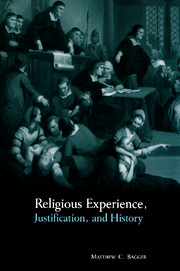Book contents
- Frontmatter
- Contents
- Acknowledgments
- List of abbreviations
- Chapter 1 Introduction: spectral evidences
- Chapter 2 The explanation in experience and the explanation of experience
- Chapter 3 Justification by reasons alone
- Chapter 4 Perennialism revisited
- Chapter 5 The miracle of minimal foundationalism
- Chapter 6 Loves noble Historie: Teresa of Avila's mystical theology
- Chapter 7 Modernity and its discontents
- Bibliography
- Index
Chapter 1 - Introduction: spectral evidences
Published online by Cambridge University Press: 22 September 2009
- Frontmatter
- Contents
- Acknowledgments
- List of abbreviations
- Chapter 1 Introduction: spectral evidences
- Chapter 2 The explanation in experience and the explanation of experience
- Chapter 3 Justification by reasons alone
- Chapter 4 Perennialism revisited
- Chapter 5 The miracle of minimal foundationalism
- Chapter 6 Loves noble Historie: Teresa of Avila's mystical theology
- Chapter 7 Modernity and its discontents
- Bibliography
- Index
Summary
The whole business is become hereupon so snarled, and the determination of the Question one way or another, so dismal, that our Honourable Judges have a Room for Jehoshaphat's Exclamation, We know not what to do! They have used, as Judges heretofore have done, the Spectral Evidences, to introduce their further Enquiries into the Lives of the persons accused; and they have thereupon, by the wonderful Providence of God, been so strengthened with other evidences, that some of the Witch Gang have been fairly Executed.
Cotton Mather, The Wonders of the Invisible World (1692)Ever since Schleiermacher exalted feeling when addressing religion's “cultured despisers,” apologists have periodically exploited religious experience. With all the more traditional avenues of theism's defense generally in disrepute, modern theologians and religious philosophers have repeatedly sought to justify religious belief rationally by reference to the individual's experience. Charles Darwin in 1876 remarked on the prevalence of this strategy. “At the present day the most usual argument for the existence of an intelligent God is drawn from the deep inward conviction and feelings which are experienced by most persons.” This argument left Darwin rightfully unpersuaded. Experience has recently once again, however, become the focus of those aiming to vindicate the rationality of religious belief. This time the apologists hail from the ranks of analytic philosophy. Increasingly, we find philosophers defending the justification of theistic beliefs based on extraordinary experiences (so-called “perceptions of God”).
- Type
- Chapter
- Information
- Religious Experience, Justification, and History , pp. 1 - 20Publisher: Cambridge University PressPrint publication year: 1999



